
ARCHIVES OF TOXICOLOGY
Scope & Guideline
Advancing the Frontiers of Toxicological Science
Introduction
Aims and Scopes
- Molecular and Cellular Toxicology:
Research examining the molecular mechanisms by which toxic substances induce cellular damage, including oxidative stress, DNA damage, and apoptosis. - Environmental Toxicology:
Studies that investigate the impact of environmental pollutants, including heavy metals, pesticides, and microplastics, on ecosystems and human health. - Pharmacology and Drug Toxicity:
Exploration of the toxicological profiles of pharmaceutical agents, including adverse effects, mechanisms of toxicity, and the development of predictive models. - Risk Assessment and Regulatory Toxicology:
Research aimed at improving methodologies for assessing chemical safety and regulatory compliance, including new approach methodologies (NAMs) and predictive toxicology. - Neurotoxicology:
Studies focusing on the effects of toxic substances on the nervous system, including developmental neurotoxicity and the impact of drugs on neuronal health. - Genotoxicity and Carcinogenicity:
Investigation into the genetic impact of various substances, including their potential to cause mutations and cancer. - Toxicokinetics and Metabolism:
Research exploring how toxic substances are metabolized and their pharmacokinetics in biological systems, with implications for exposure assessment.
Trending and Emerging
- Machine Learning and Computational Toxicology:
The integration of machine learning techniques for predicting toxicity outcomes and enhancing risk assessment methodologies is increasingly prevalent in recent publications. - Endocrine Disruption and Hormonal Toxicity:
Research focusing on endocrine disruptors and their effects on hormonal systems is gaining traction, reflecting growing concerns about their impact on health. - Microbiome-Toxicology Interactions:
Investigations into how environmental toxins interact with the human microbiome and their implications for health are emerging as a significant area of research. - Nanotoxicology:
The study of the toxicological effects of nanomaterials is rapidly expanding, driven by the increasing use of nanotechnology in various industries. - Environmental Justice and Exposome Studies:
Research addressing the health impacts of environmental exposures, especially in vulnerable populations, is becoming more prominent, highlighting the importance of social determinants of health. - 3D In Vitro Models:
The use of advanced 3D cell culture systems and organoids for toxicological testing is trending, as these models better mimic in vivo environments compared to traditional 2D cultures. - Toxicogenomics:
The application of genomics to understand the effects of toxic substances at the molecular level is increasingly featured, emphasizing personalized approaches in toxicology.
Declining or Waning
- Traditional Animal Testing:
As the field moves towards alternative methods and NAMs, the focus on traditional animal testing protocols is decreasing, leading to fewer publications in this area. - General Toxicological Reviews:
While comprehensive reviews are still valuable, there has been a notable decline in broad, non-specific toxicological reviews as researchers focus on more niche, specialized topics. - Single Substance Studies:
There is a shift away from studies focusing solely on the toxicity of individual compounds towards research that examines mixtures and the cumulative effects of multiple exposures. - Historical Toxicology Studies:
Research centered on historical or anecdotal toxicology cases is becoming less common, as the field prioritizes contemporary issues and modern methodologies. - Basic Toxicological Mechanisms:
While foundational knowledge remains important, the emphasis has shifted towards applications and implications of toxicological findings rather than solely elucidating basic mechanisms.
Similar Journals

NEUROTOXICOLOGY
Unraveling the Complexities of NeurotoxicityNEUROTOXICOLOGY, published by Elsevier, stands at the forefront of research in the disciplines of neuroscience and toxicology, contributing significantly to the understanding of neurotoxic effects and their implications for health. With an impact factor positioned within the second quartile in both neuroscience and toxicology categories, this journal has established itself as a crucial platform for disseminating high-quality research findings and innovative methodologies. Since its inception in 1979 and continuing through 2024, NEUROTOXICOLOGY has provided valuable insights and evidence-based studies that facilitate advancements in the fields of pharmacology and neuroscience, making it a pivotal resource for researchers, professionals, and students alike. Although not an open-access publication, it offers extensive access options ensuring wide dissemination of knowledge. Located in the Netherlands, the journal’s continued commitment to excellence is evident through its high rankings in Scopus, reflecting its prominence and relevance in the scientific community.
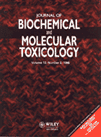
JOURNAL OF BIOCHEMICAL AND MOLECULAR TOXICOLOGY
Exploring the Intersection of Health and ToxicologyJournal of Biochemical and Molecular Toxicology, published by Wiley, plays a pivotal role in the advancement of knowledge within the fields of biochemistry, toxicology, and molecular biology. Established in 1998, this esteemed journal has garnered a significant reputation, evidenced by its current placement in the Q2 quartile across several categories, including Biochemistry, Health, Toxicology and Mutagenesis, and Medicine. With an ISSN of 1095-6670 and an E-ISSN of 1099-0461, it serves an international audience, offering critical insights and innovative research that shape our understanding of biochemical interactions and toxicological assessments. While it does not operate on an open-access model, the journal ensures rigorous peer review and high-quality publication standards, making it a valuable resource for researchers, professionals, and students dedicated to the exploration of molecular toxicology. The journal's recognized impact within the scientific community is reflected in its competitive rankings among specialized journals, fostering significant contributions to both academic and applied contexts.
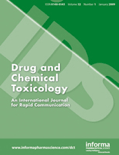
DRUG AND CHEMICAL TOXICOLOGY
Empowering public health through toxicology research.Drug and Chemical Toxicology is a well-respected journal in the fields of toxicology, pharmacology, and public health, published by Taylor & Francis Ltd. Since its inception in 1978, this journal has diligently explored the effects and mechanisms of chemical exposures on health and the environment, fulfilling a crucial role in advancing scientific understanding and safeguarding public health. The journal is indexed across prestigious databases and features an impressive array of articles categorized within the Q2 and Q3 quartiles across various categories in 2023, reflecting its significance in Chemical Health and Safety as well as Environmental and Occupational Health disciplines. With an extensive reach and a focus on interdisciplinary research, Drug and Chemical Toxicology offers a rich repository of original research, reviews, and methodological advancements, catering to a diverse audience of researchers, professionals, and students dedicated to the betterment of safety and health standards. Although not an open-access publication, its articles are widely accessible to the academic community, ensuring that critical innovations and insights are shared for the greater good.

Toxicological Research
Elevating toxicological research to new heights of understanding.Toxicological Research is a prominent academic journal dedicated to advancing the field of toxicology through rigorous exploration and innovative research. Published by the Korean Society of Toxicology, this journal serves as a vital resource for researchers, professionals, and students engaged in environmental science, pharmacology, and toxicology. With an ISSN of 1976-8257 and an E-ISSN of 2234-2753, Toxicological Research highlights significant findings and discussions in the realm of health, toxicology, and mutagenesis. Although not an open-access journal, it maintains a solid reputation as evidenced by its Q3 ranking in both health-related toxicology and general toxicology categories for 2023. The journal covers a broad spectrum of topics from fundamental research to applied toxicology and provides a unique platform for the dissemination of knowledge in a field that is increasingly relevant in today’s society. With an anticipated convergence period from 2008 to 2024, Toxicological Research continues to contribute vital insights to understanding the implications of toxic substances on health and the environment.
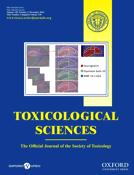
TOXICOLOGICAL SCIENCES
Empowering Research, Protecting HealthTOXICOLOGICAL SCIENCES, published by Oxford University Press, is a premier journal in the field of toxicology that has been a cornerstone of scientific discourse since its inception in 1981. With an impressive 2023 impact factor and ranked in the Q1 category for Toxicology, this journal is highly regarded among researchers, professionals, and students dedicated to pharmacology and toxicology. The journal is committed to advancing the understanding of toxicological science, covering a breadth of topics that include the mechanisms of toxicity, risk assessment, and the regulatory aspects affecting public health. With an ISSN of 1096-6080 and an E-ISSN of 1096-0929, TOXICOLOGICAL SCIENCES facilitates open access scholarly work, ensuring that critical research reaches a global audience and promotes collaborative learning. As it converges towards 2024, the journal remains pivotal in shaping the future of toxicology research, providing insights that are essential for developing safer chemicals and protecting environmental health.

Frontiers in Toxicology
Empowering Knowledge in Toxicological ScienceFrontiers in Toxicology, published by Frontiers Media SA, is a prominent open-access journal dedicated to advancing the understanding of toxicological science. Established in 2019, it serves as a vital forum for innovative research, offering insights into the pharmacological impacts and toxicological profiles of various substances. With its international reach based in Switzerland, this journal has quickly ascended in the academic community, achieving a notable Q1 ranking in Pharmacology, Toxicology and Pharmaceutics (Miscellaneous) and a Q2 ranking in Toxicology as of 2023. The journal is indexed in Scopus, where it ranks #8 out of 43 in its primary category, underscoring its influence and relevance in the field. The scope encompasses cutting-edge studies on the mechanisms of toxicity, including both human and environmental impacts, making it an essential resource for researchers, professionals, and students alike. By promoting open access to high-quality research, Frontiers in Toxicology plays a crucial role in enhancing knowledge sharing and fostering collaboration across disciplines.
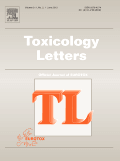
TOXICOLOGY LETTERS
Unveiling the impacts of substances on health and environment.TOXICOLOGY LETTERS is a prominent journal dedicated to advancing the field of toxicology, providing a platform for high-quality research and reviews that explore the effects of chemical substances on biological systems. Published by Elsevier Ireland Ltd, this peer-reviewed journal has established itself as a vital resource in toxicological research since its inception in 1977, with a convergence of studies extending to 2024. With an impressive Scopus ranking, positioned at #28 out of 133 in the Toxicology category, TOXICOLOGY LETTERS garners a respectable percentile of 79, highlighting its significance in the academic community. Although it is not an open-access journal, its research is accessible through institutional subscriptions, ensuring that critical insights into human health and environmental safety are disseminated effectively. Being categorized in the Q2 quartile in both Medicine (miscellaneous) and Toxicology for 2023 further emphasizes its relevance and impact in these fields. This journal aims to foster collaboration between researchers and professionals, encouraging the exploration of innovative solutions to chemical hazards and the promotion of safer practices in pharmacology and toxicology.
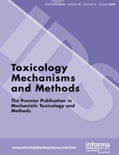
TOXICOLOGY MECHANISMS AND METHODS
Advancing toxicological insights for a safer tomorrow.TOXICOLOGY MECHANISMS AND METHODS is a distinguished peer-reviewed journal dedicated to the advancement of toxicological research, published by Taylor & Francis Ltd. With its ISSN 1537-6516 and E-ISSN 1537-6524, this esteemed journal features critical studies and innovative methodologies in the field of toxicology, aligning with its mission to enhance understanding of biological mechanisms and risk assessment. The journal holds a commendable Q2 ranking in both the Health, Toxicology and Mutagenesis, and Toxicology categories, as well as strong positions in Scopus rankings, reflecting its influence with a 71st percentile rank in Toxicology and a 69th percentile rank in Environmental Health. Researchers, professionals, and students in the toxicology domain will find this journal to be an invaluable resource, offering open access options that foster widespread dissemination of its findings. Since its inception, encompassing converged years from 1991 to 1995 and from 2002 to 2024, the journal remains at the forefront of critical discourse and innovative research methods, making it a vital platform for advancing toxicological science globally.
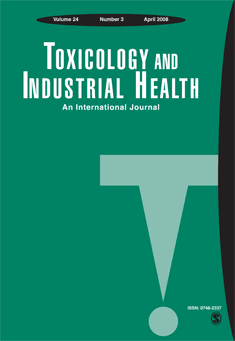
TOXICOLOGY AND INDUSTRIAL HEALTH
Exploring the complexities of toxicology for public health advancement.TOXICOLOGY AND INDUSTRIAL HEALTH, published by SAGE PUBLICATIONS INC, is a premier journal in the field of toxicology, public health, and environmental health, with a significant history dating back to 1985. With its ISSN 0748-2337 and E-ISSN 1477-0393, the journal provides a platform for disseminating groundbreaking research and comprehensive reviews that address the complexities of toxic substances in industrial and occupational settings. Despite its Q3 ranking among peers in health, toxicology, and public health, this journal is becoming increasingly influential, reflected in its growing citation metrics. Researchers and professionals benefit from its commitment to fostering knowledge in both theoretical and practical contexts, making it an essential resource for those dedicated to advancing understanding in this vital field. The journal's main objectives include promoting research addressing the implications of toxicology on health and safety standards across industries, ensuring accessibility to current studies for a global audience. Overall, TOXICOLOGY AND INDUSTRIAL HEALTH plays a critical role in bridging the gap between research and real-world applications, proving invaluable to students, professionals, and researchers alike in their pursuit of enhancing public health and environmental safety.
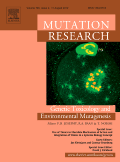
MUTATION RESEARCH-GENETIC TOXICOLOGY AND ENVIRONMENTAL MUTAGENESIS
Unraveling the complexities of mutagenic processes for a safer tomorrow.MUTATION RESEARCH-GENETIC TOXICOLOGY AND ENVIRONMENTAL MUTAGENESIS, published by Elsevier, is a renowned journal that explores critical advancements in the field of genetic toxicology and environmental mutagenesis. With an ISSN of 1383-5718 and an E-ISSN of 1879-3592, it ranks in Q3 for Genetics and Q2 for Health, Toxicology, and Mutagenesis as of 2023. This journal not only emphasizes the importance of environmental factors in genetic material alterations but also disseminates significant research findings that aid in understanding the implications for public health and safety. Operating from Amsterdam, Netherlands, it serves as a pivotal platform for researchers, professionals, and students, fostering an informed community keen on evolving the parameters of genetic research. Although it currently does not offer open access, the journal's commitment to high-quality peer-reviewed content ensures substantial contributions to the academic literature, enhancing our comprehension of mutagenic processes and their environmental triggers.